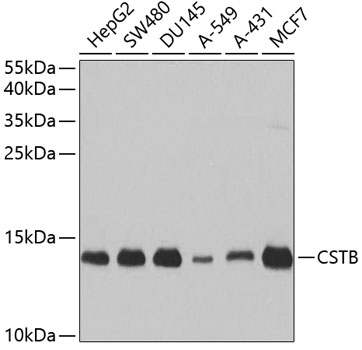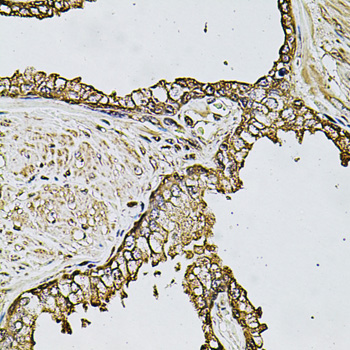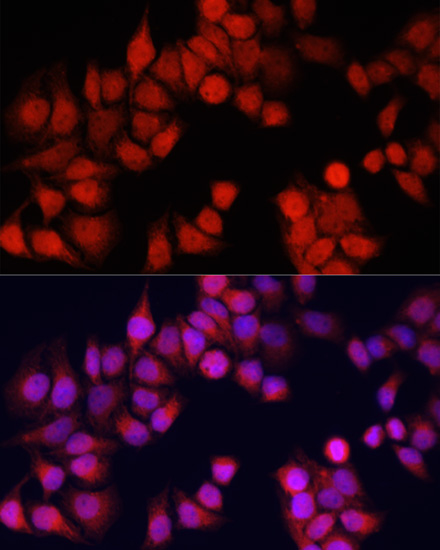Cell Biology Antibodies 9
Anti-CSTB Antibody (CAB3815)
- SKU:
- CAB3815
- Product Type:
- Antibody
- Reactivity:
- Human
- Reactivity:
- Rat
- Host Species:
- Rabbit
- Isotype:
- IgG
- Research Area:
- Cell Biology
Description
| Antibody Name: | Anti-CSTB Antibody |
| Antibody SKU: | CAB3815 |
| Antibody Size: | 20uL, 50uL, 100uL |
| Application: | WB IHC IF |
| Reactivity: | Human, Rat |
| Host Species: | Rabbit |
| Immunogen: | Recombinant fusion protein containing a sequence corresponding to amino acids 1-98 of human CSTB (NP_000091.1). |
| Application: | WB IHC IF |
| Recommended Dilution: | WB 1:500 - 1:2000 IHC 1:50 - 1:200 IF 1:50 - 1:200 |
| Reactivity: | Human, Rat |
| Positive Samples: | HepG2, SW480, DU145, A-549, A-431, MCF7 |
| Immunogen: | Recombinant fusion protein containing a sequence corresponding to amino acids 1-98 of human CSTB (NP_000091.1). |
| Purification Method: | Affinity purification |
| Storage Buffer: | Store at -20'C. Avoid freeze / thaw cycles. Buffer: PBS with 0.02% sodium azide, 50% glycerol, pH7.3. |
| Isotype: | IgG |
| Sequence: | MMCG APSA TQPA TAET QHIA DQVR SQLE EKEN KKFP VFKA VSFK SQVV AGTN YFIK VHVG DEDF VHLR VFQS LPHE NKPL TLSN YQTN KAKH DELT YF |
| Gene ID: | 1476 |
| Uniprot: | P04080 |
| Cellular Location: | Cytoplasm, Nucleus |
| Calculated MW: | 11kDa |
| Observed MW: | 14kDa |
| Synonyms: | CSTB, CPI-B, CST6, EPM1, EPM1A, PME, STFB, ULD |
| Background: | The cystatin superfamily encompasses proteins that contain multiple cystatin-like sequences. Some of the members are active cysteine protease inhibitors, while others have lost or perhaps never acquired this inhibitory activity. There are three inhibitory families in the superfamily, including the type 1 cystatins (stefins), type 2 cystatins and kininogens. This gene encodes a stefin that functions as an intracellular thiol protease inhibitor. The protein is able to form a dimer stabilized by noncovalent forces, inhibiting papain and cathepsins l, h and b. The protein is thought to play a role in protecting against the proteases leaking from lysosomes. Evidence indicates that mutations in this gene are responsible for the primary defects in patients with progressive myoclonic epilepsy (EPM1). One type of mutation responsible for EPM1 is the expansion in the promoter region of this gene of a CCCCGCCCCGCG repeat from 2-3 copies to 30-78 copies. |
| UniProt Protein Function: | CSTB: This is an intracellular thiol proteinase inhibitor. Tightly binding reversible inhibitor of cathepsins L, H and B. Defects in CSTB are the cause of progressive myoclonic epilepsy type 1 (EPM1). EPM1 is an autosomal recessive disorder characterized by severe, stimulus-sensitive myoclonus and tonic-clonic seizures. The onset, occurring between 6 and 13 years of age, is characterized by convulsions. Myoclonus begins 1 to 5 years later. The twitchings occur predominantly in the proximal muscles of the extremities and are bilaterally symmetrical, although asynchronous. At first small, they become late in the clinical course so violent that the victim is thrown to the floor. Mental deterioration and eventually dementia develop. Belongs to the cystatin family. |
| UniProt Protein Details: | Protein type:Inhibitor Chromosomal Location of Human Ortholog: 21q22.3 Cellular Component: extracellular space; cytoplasm; nucleolus Molecular Function:protease binding; endopeptidase inhibitor activity; cysteine protease inhibitor activity Biological Process: negative regulation of proteolysis; regulation of apoptosis; adult locomotory behavior; negative regulation of peptidase activity Disease: Myoclonic Epilepsy Of Unverricht And Lundborg |
| NCBI Summary: | The cystatin superfamily encompasses proteins that contain multiple cystatin-like sequences. Some of the members are active cysteine protease inhibitors, while others have lost or perhaps never acquired this inhibitory activity. There are three inhibitory families in the superfamily, including the type 1 cystatins (stefins), type 2 cystatins and kininogens. This gene encodes a stefin that functions as an intracellular thiol protease inhibitor. The protein is able to form a dimer stabilized by noncovalent forces, inhibiting papain and cathepsins l, h and b. The protein is thought to play a role in protecting against the proteases leaking from lysosomes. Evidence indicates that mutations in this gene are responsible for the primary defects in patients with progressive myoclonic epilepsy (EPM1). [provided by RefSeq, Jul 2008] |
| UniProt Code: | P04080 |
| NCBI GenInfo Identifier: | 1706278 |
| NCBI Gene ID: | 1476 |
| NCBI Accession: | P04080.2 |
| UniProt Related Accession: | P04080 |
| Molecular Weight: | 11,140 Da |
| NCBI Full Name: | Cystatin-B |
| NCBI Synonym Full Names: | cystatin B (stefin B) |
| NCBI Official Symbol: | CSTB |
| NCBI Official Synonym Symbols: | PME; ULD; CST6; EPM1; STFB; EPM1A |
| NCBI Protein Information: | cystatin-B; CPI-B; liver thiol proteinase inhibitor |
| UniProt Protein Name: | Cystatin-B |
| UniProt Synonym Protein Names: | CPI-B; Liver thiol proteinase inhibitor; Stefin-B |
| Protein Family: | Cystatin |
| UniProt Gene Name: | CSTB |
| UniProt Entry Name: | CYTB_HUMAN |
View AllClose





![Anti-CSTB Antibody (CAB19961)[KO Validated] Anti-CSTB Antibody (CAB19961)[KO Validated]](https://cdn11.bigcommerce.com/s-rd6ounxcu2/images/stencil/590x590/products/56128/61310/anti-cstb-antibody-cab19961ko-validated__19974__38064.1706533766.jpg?c=1)

![CSTB Monoclonal Antibody [P2F1AT] (CPAB0524) CSTB Monoclonal Antibody [P2F1AT] (CPAB0524)](https://cdn11.bigcommerce.com/s-rd6ounxcu2/images/stencil/590x590/products/58745/63927/cstb-monoclonal-antibody-p2f1at-cpab0524__64230__10235.1706535203.jpg?c=1)

